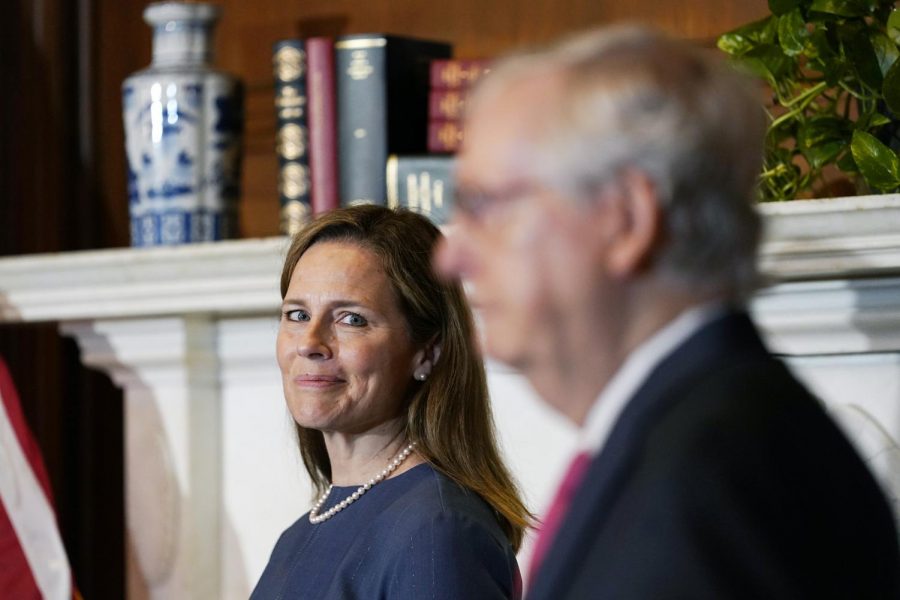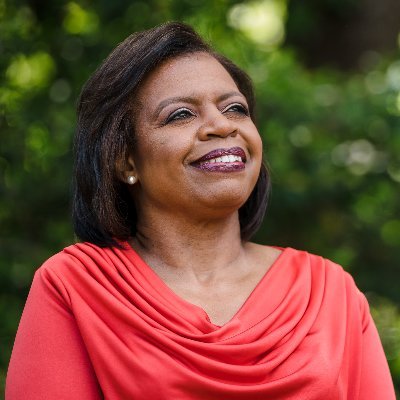OPINION: Amy Coney Barrett is the polar opposite of Ruth Bader Ginsburg
Trump’s top pick, Amy Coney Barrett, was formally nominated to the Supreme Court this past Saturday at the White House Rose Garden. There is no doubt that the Senate will push through her confirmation, which would make her the fifth woman in history to sit on the high court’s bench. She has quite the seat to fill, as Ruth Bader Ginsburg was a beloved American icon affectionately dubbed as “The Notorious RBG.” As America mourns the loss of Ginsburg, feelings of fear float amongst those questioning the future of the Affordable Care Act (ACA) and reproductive rights. One thing that is clear is that Barrett is undoubtedly the polar opposite of the women’s rights activist and former ACLU lawyer Ginsburg.
There has been an immense amount of concern from democrats on how Barrett’s Roman Catholic faith will affect her rulings. In her acceptance of the Supreme Court nomination, she spoke of the late Justice Antonin Scalia whom she clerked for over 20 years ago, saying that they shared the same judicial philosophy.
“Judges are not policymakers, and they must be resolute in setting aside any policy views they might hold,” she stated.
Despite her statement, the question of if she can truly divert from her faith on the bench certainly raises eyebrows. For instance, in 2015 she signed a joint letter to the Synod fathers which states that “life begins at conception and ends at natural death.” In a 1998 law paper, she has also suggested that Catholic judges should recuse themselves in cases that involve the death penalty, as this would conflict with their faith. By the logic of the latter statement, she would have to recuse herself in any situation where she felt that her faith could conflict with the law. This undermines the purpose of serving on the highest court in the nation, as we look to the Supreme Court to abide by the Constitution rather than personal or moral convictions.
There is also a concern regarding her views on the practice of stare decisis, which she has previously criticized. Stare decisis is the reliance on past judicial decisions to interpret new ones. This is certainly a discussion topic when it comes to Roe v. Wade, as Trump has previously stated publicly that he would like to appoint new justices for the purpose of overturning Roe v. Wade. Despite the fact that she is yet to rule on a case directly involving abortion, she has voted on cases to oppose loosening abortion restrictions. She was also in favor of a rehearing a case that questioned the constitutionality of an Indiana law that required fetal remains from abortions to be buried or cremated. That law was reinstated following the case, despite the fact that she had faced an overpowering opposition.
As the Supreme Court may have once been its own legal body of the U.S. government, it is now a partisan battleground for both sides of the aisle. Assuming we will have a 6-3 conservative majority on the court, the future of the ACA also seems to be at stake. Barrett has criticized the ACA before, saying that it “infringed on religious freedoms” by imploring employers to provide contraceptives in their insurance plans. She will most likely be pushed through the confirmation process as quickly as possible, as opening arguments for the ACA will be heard by the court on Nov. 10. This is all too convenient for Trump, who also believes that the Supreme Court will decide the outcome of the 2020 presidential race.
Barrett is undoubtedly the epitome of everything Ginsburg fought against, despite conservatives enthusiastically cheering her on. She is highly educated and well-spoken, yet glides through the doors of law that Ginsburg busted down for her, failing to protect the freedoms of other women. Attacking someone else’s faith is never justified, but it can certainly be questioned if Barrett allows her faith to interfere with her jurisprudence. During Barrett’s confirmation hearings for the 7th U.S. Court of Appeals, Democratic Senator Diane Feinstein also brought up concerns about Barrett’s faith and her ability to uphold the law. There is no doubt that these concerns will resurface during her Supreme Court confirmation hearings.
Barrett is a graduate of Notre Dame Law School, therefore I do not question her ability to understand the Constitution of the United States. I do not question the commitment she has to her faith, as I’m sure it is a reflection of who she is as a person. She has been described by students and colleagues affectionately, and I certainly commend her for being a mother to 7 children, no less. However, it is concerning when one’s beliefs overlap in their interpretation of the law. Despite the fact that she says she will not do that, it is hard to believe. The Supreme Court is not separate from the political sphere and if we deny that, we are naive. We appoint justices who are labeled as liberal or conservative for a very specific purpose, which is to serve political agendas.
I intend to follow Barrett’s confirmation with an open mind, despite the fact that we have different ideologies. Being the fifth woman appointed to the Supreme Court itself is incredible, and my hope is that she honors the woman who sat there long before her. Not particularly with belief systems but in a way that Ginsburg would have wanted her successor to serve, which is by following the law and doing so with great honor.













Marilyn Goldberg • Sep 30, 2020 at 1:54 pm
Excellent article as usual by our granddaughter Hannah
Proud of your inspiring writing.